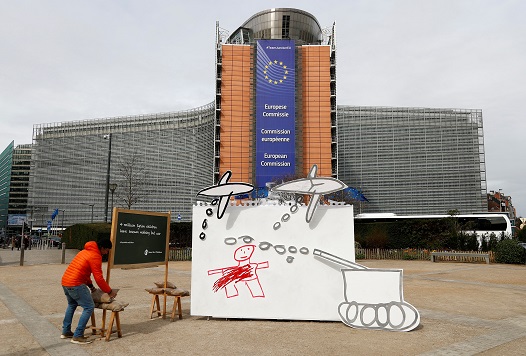EU countries are evidently re-opening their embassies in Damascus. In fact, it was recently revealed that diplomats from Greece, Hungary, and Serbia have arrived in the Syrian capital, with preparations underway to resume diplomatic activities. These developments come at a time when attention is not only focused on Syria’s political and economic future but also the positions and actions of Arab nations, which — under the leadership of Gulf states — have imposed total isolation on Damascus for a decade.
The announcement that Cyprus and Greece will re-open their embassies is the most prominent step. According to observers, this development involves several aspects and rationales. In May 2020, the Greek Foreign Ministry announced that it had sent a special envoy to Damascus, releasing a statement saying that: “[The diplomatic mission] will cover international aspects of Syrian policy and related humanitarian work, as well as coordinating measures aimed at supporting efforts to rebuild Syria.” The statement continued: “This step is a very strategic one: a person familiar with Syria and the Syrian authorities has been appointed, which indicates that the embassy in Damascus will soon re-open.”
As for the Hellenic Republic’s interests in taking this step, a Greek newspaper highlighted the country’s troubled relationship with Turkey, which occupies parts of northern Syria and Greece. “By resuming relations with Syria, the eastern Mediterranean’s balance of power will shift again in Greece’s favor, because Turkey has no allies in the region,” said the Greek newspaper, referring specifically to Turkey’s oil exploration activities in the Eastern Mediterranean.
As for the Cypriot Embassy, local radio Sham FM quoted diplomatic sources, who confirmed that: “The Cypriot and Greek embassies reopened in Damascus over six months ago, and were represented by a chargé d’affaires; the Hungarian Embassy has had the same level of representation for almost one year.” The diplomatic sources explained that these developments were not announced publicly, for the three countries to avoid being exposed to pressure in Europe.
Never involved in clashes
The news of the Cypriot and Greek embassies reopening is not a surprise; the real surprise is the fast pace at which embassies are opening completely. Political expert Ammar Wakaf commented on these developments in an interview with Athr: “What is new in these developments is the acceleration of the resumption of diplomatic ties with Europe and the symbolic timing of this policy alongside the Syrian presidential elections. Nevertheless, the central rationale has remained the same: The Syrian state will not collapse, and therefore we (i.e. Europeans) must open diplomatic channels with Syria to safeguard our interests.”
When commenting on the rationale for the European states restoring relations with Damascus — even though there has been no change in Syria’s policies or any concessions from the Syrian state — Wakaf said: “Two basic drivers force this bloc of countries, perhaps more than any others, to return to Damascus. First, these countries feel marginalized in terms of their influence over the direction of the Syrian crisis. Second, this loss of influence increasingly favors countries that the European states view as competitors.
In these circumstances, European countries like Cyprus, Greece, and Hungary — which have never been closely involved in clashes with the Syrian state — are paving the way for the entire bloc to build initial channels of communication.”
Importantly, these decisions have been taken by countries that belong to a union currently imposing severe economic sanctions on Syria, while also consistently adopting an antagonistic position to Syrian policy. A question therefore arises: what follows this step and is there a chance that the European Union will ease the economic pressure applied to Syria?
On this issue, Wakaf said: “We have to show some reserve in our conclusions about the consequences of these developments. The European bloc is not expected to ease official sanctions on Syrians soon simply because these three countries are reopening their embassies. There may be some leniency here or there — and one might even expect more deals like these ones — but the official European position still remains in line with the U.S. stance, with advocates tightening sanctions,” Wakaf said. He added: “Nevertheless, it can be said that a breach in the wall has opened. This will lead to more breakthroughs, which will ultimately have a positive impact on Syria’s economic and political situation.”
It is clear that Cyprus and Greece, which are working towards a rapprochement with Syria, have multiple objectives. These aims include forming an alliance with Syria against a common enemy that affects their interests significantly. In fact, Cyprus and Greece are witnessing tension in their relationship with Turkey, which occupies parts of northern Syria.
According to the “Al-Arab” newspaper, observers interpret Greece’s move as an attempt to get closer to Syria and build an alliance between the two countries, capable of confronting Turkey in the eastern Mediterranean. This approach can be used with other countries that share certain positions with Syria, in light of tensions between nations around the world. As a result, Syria can return to its standing in the Arab and international arenas without making any concessions. Analysts highlight that what is taking place clearly demonstrates the remarkable political changes that will occur in Syria, after which economic changes will naturally follow.
This article was translated and edited by The Syrian Observer. The Syrian Observer has not verified the content of this story. Responsibility for the information and views set out in this article lies entirely with the author.


